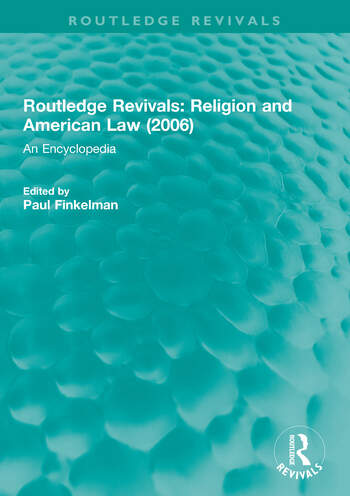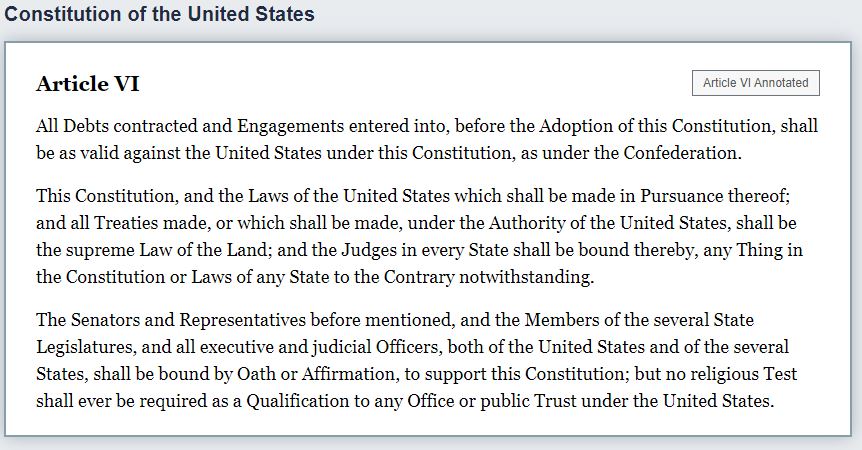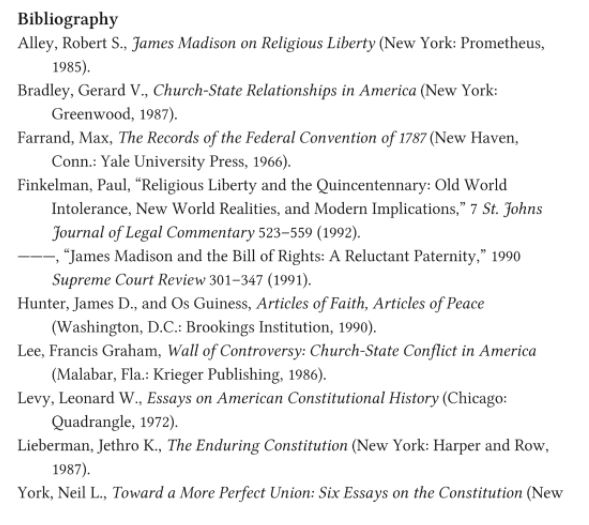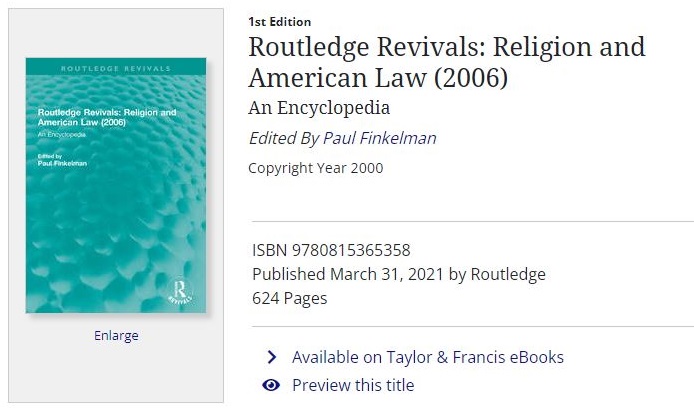Routledge Revivals: Religion and American Law (2006)
An Encyclopedia
Edited By Paul Finkelman
Copyright Year 2000

Founders and Religion
The federal Constitutional Convention met in Philadelphia in 1787 from May 25 through September 17. During the nearly four months of debate the subject of religion was brought up only a few times, and in no instance did a member propose a national religious establishment. In fact, after observing on June 28 that “4 or five weeks of close attendance and continual reasonings” on the issue of representation had produced so thorough a deadlock that the convention itself seemed threatened, Benjamin Franklin proposed that “prayers imploring the assistance of Heaven, be held … every morning before we proceed to business.” Following a brief discussion in which “only three or four persons” spoke in support of Franklin’s motion, members adjourned without voting. The idea was never mentioned again.
Most delegates seemed to agree with South Carolina’s Charles Pinckney, who, in a speech on June 25, described the opportunity before the convention in the following words: “Our situation appears to me to be this—a new, extensive country containing within itself, the materials of forming a government capable of extending to its citizens all the blessings of civil & religious liberty.” The Founders’ unwillingness to use the federal Constitution to protect or establish religion in the new nation is explained by the role of religion during the colonial history of the country, by the way in which religion had been treated in the state constitutions since the Revolution, and by the founding generation’s visions of both religion and government.
America’s geographic isolation and the initial isolation of each community within America were partly responsible for preventing the establishment of a national religion. John Winthrop and his Puritan coreli^onisrs left England specifically to get beyond the reach of the Church of England. These early colonists were as firmly dedicated to the idea of governing their own churches as they were to governing their own communites. Although they initially were quite willing and even eager to establish close and supportive relations between church and state, the increasing secularization and advancing diversity of colonial society during the eighteenth century weakened these ties markedly.
The American Revolution—although fought for many different reasons—brought demands for enhanced political, economic, and religious rights and liberties to the fore. Not surprisingly, then, when the newly independent states turned to writing constitutions in the summer and foil of 1776, virtually every one contained a bill of rights that promised religious freedom to citizens. Virginia led the way in its June 12, 1776, Declaration of Rights. Section 16 read: “That religion, or the duty which we owe to our CREATOR, and the manner of discharging it, can be directed only by reason and conviction, not by force or violence; and therefore all men are equally entitled to the free exercise of religion, according to the dictates of conscience; and that it is the mutual duty of all to practice Christian forbearance, love, and charity, toward each other.” Five other states—Delaware, Maryland, New Jersey, Pennsylvania, and North Carolina—enacted similar provisions before the year was out, and most others followed soon thereafter.
Section 2 of Delaware’s Declaration of Rights and Fundamental Rules read: “That all men have a natural and unalienable Right to worship Almighty God according to the Dictates of their own Consciences and Understanding.” The Declaration of Rights contained in the Maryland Constitution of 1776 read: “That, as it is the duty of every man to worship God in such a manner as he thinks most acceptable to him; all persons, professing the Christian religion, are equally entitled to protection of their religious liberty.” New Jersey provided “[t]hat no person shall ever, within this Colony, be deprived of the inestimable privilege of worshipping Almighty God in a manner agreeable to the dictates of his own conscience.” North Carolina promised, “[t]hat all men have a natural and unalienable right to worship Almighty God according to the dictates of their own consciences.”
Very similar language appeared in almost every state constitution that was written in 1776 and 1777. Established state religions that sought actively to prohibit the practice of other religions were rapidly becoming a thit^ of the past in the new nation.
Nonetheless, most of the same state constitutions that proclaimed religious liberty also contained provisions that limited full religious freedom to—in the words of the Delaware and Maryland declarations— “Persons professing the Christian religion.” The New Jersey Constitution, for example, declared “[t]hat there shall be no establishment of any one religious sect in this Province.” However; it then went on to say “that all persons, professing a belief in the faith of any Protestant sect… shall be capable of being elected into any office of profit or trust.” The North Carolina Constitution, just before declaring “no establishment,” declared “[tjhat no person, who shall deny the being of God or the truth of the Protestant religion, or the divine authority of either of the Old or New Testaments… shall be capable of holding any office or place of trust or profit in the civil department within this State.” Hie Pennsylvania Constitution contained similar language.
Therefore, the issue before the Constitutional Convention was never whether to establish a national religion in America. Ratbei^ the question was whether religious tests of any kind—even of adherence to Protestantism broadly understood—would be permitted under the national Constitution. Not surprisingly, concerned Catholics and Jews waited nervously as the convention deliberated. After more than three months of silence, Jonas Phillips, on behalf of “the people called Jews of the City of Philadelphia,” wrote to the president and members of the convention to plead that “the natural and unalienable Right To worship almighty God according to the dictates of their own Conscience and understanding” be fully respected in the new Constitution. Although this plea came too late to affect the work of the convention, it did reflect the concern that all non-Protestants felt about how a more powerful national government might treat their still-unrealized right to religious liberty free from political discrimination.
Of all the delegates attending the convention, Charles Pinckney and James Madison were most determined to ensure that a religious test would not be permitted. On Monday, August 20, 1787—three months into the debates of the convention—the members unanimously passed and sent to the Committee of Detail a long list of propositions authored by Charles Pinckney. Included among Pinckney’s proposals was one requiring that “[njo religious test or qualification shall ever be annexed to any oath of office under the authority of the United States.” ^th the Constitution nearly finished, the Committee of Detail was charged to put the resolutions accepted to date in appropriate form and to report to the full convention about issues that remained unresolved. The report of the Committee of Detail did not contain Pinckney’s prohibition against religious tests. Therefore, Pinckney proposed on August 30 that Article XX of the Committee of Detail report, which declared that “[tjhe Members of the Legislatures, and the executive and judicial officers of the United States, and of the several States, shall be bound by oath to support this Constitution,” be amended to add the clause “no religious test shall ever be required as a qualification to any office or public trust under the authority of the United States.” The only debate that followed Pinckney’s suggestion was a remark by Roger Sherman that this prohibition was “unnecessary, the prevailing liberality being a sufficient security against such tests.” Nonetheless, Pinckney’s motion was approved without a recorded vote, and it now appears nearly verbatim as part of Article VI of the U.S. Constitution.

Following the convention’s final adjournment, Maryland’s Luther Martin, a disgruntled former member of the convention, commented on the sparse attention given to the explicit protection of religion in the proposed Constitution; his extensive critique was entitled Genuine Information. In Section 100 of this broadside against the convention’s work, Martin admitted that “[t]he part of the system which provides, that no religious test shall ever be required as a qualification to any office or public trust under the United States, was adopted by a great majority of the convention, and without much debate.” He went on to complain that a few members, himself included, had wanted a restriction to Christians, such as that commonly found in the state constitutions. Martin wrote that “there were some members so unfashionable as to think, that a belief of the existence of a deity, and of a state of future rewards and punishments would be some security for the good conduct of our rules, and that, in a Christian country, it would be at least decent to hold out some distinction between the professors of Christianity and downright infidelity or paganism.”
Yet no anti-establishment clause—no explicit statement separating religion from the federal government—was written into the Constitution. The reason for this seeming oversight is the same reason that prominent Founders often used to deny the need for a bill of rights. Many thought that explicit protection for religion from the national government was simply unnecessary. The Constitution provided for a limited government of enumerated powers. The Constitution never gave the national government power over religion, and so any protection from abuses of that power was considered to be redundant. Edmund Randolph, in answer to an allegation by Patrick Henry that the Constitution did not provide for the protection of religious freedom, replied that nowhere in the Constitution was the national government given any power to legislate on religious matters. James Madison, the future father of the national Bill of Rights, also felt that Congress had no power over religious matters. The establishment of the national government did not alter the power of the state constitutions. Because the state constitutions and bills of rights were still in operation, the insertion of a religious freedom clause in the Constitution was felt by many to be unnecessary.
In addition, many Americans felt there was no need to worry about a national establishment of religion because of the plurality of religious sects in the country. America included dozens of different Christian sects and a small population of Jews. This plurality made an established national religion impractical as well as improbable. Randolph employed precisely this argument to assuage doubts expressed in Virginia’s ratifying convention that the Constitution did not do enough to secure freedom of religion. Randolph said: “I am a friend of a variety of sects, because they keep one another in order … And there are so many now in the United States that they will prevent the establishment of any one sect in prejudice to the rest, and will forever oppose all attempts to infringe religious liberty.”
Thus the Founders arrived at the Constitutional Convention with no intention to give the national government power over religion. Although religion played a major role in most of the Founders’ lives, they did not intend for the national government to interfere with it. They believed also that to combine religion and government would belittle and corrupt both. The Constitution was based on separating power to prevent its misuse, and the absence of any religious establishment is merely a logical extension of that system. Thus, the aim of the men who attended the Constitutional Convention was to join the states into a viable government. Neither restraining nor establishing religion was seen as the proper role for government; that role was to be left with the states and, ultimately, with the people.
Calvin Jillson Michelle Dye Neumann

(New York: State University of New York Press, 1988).
